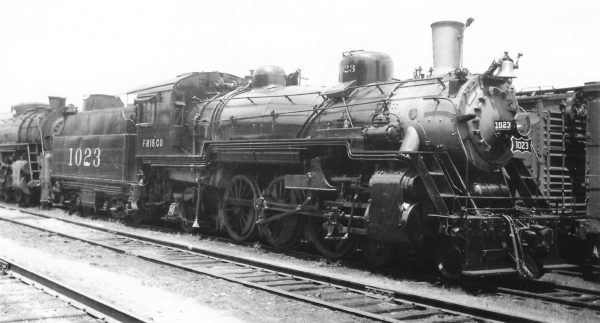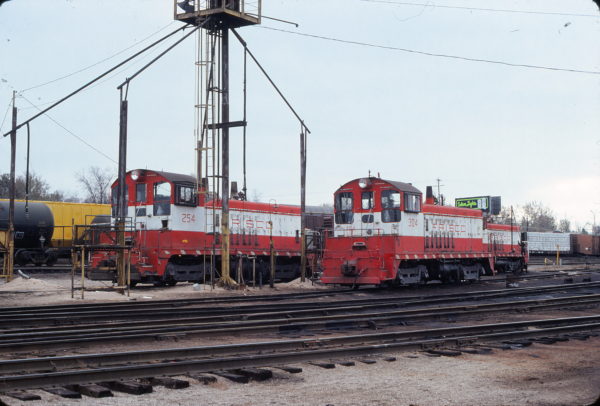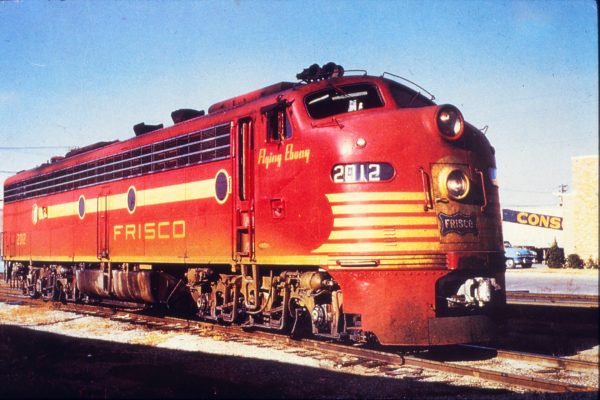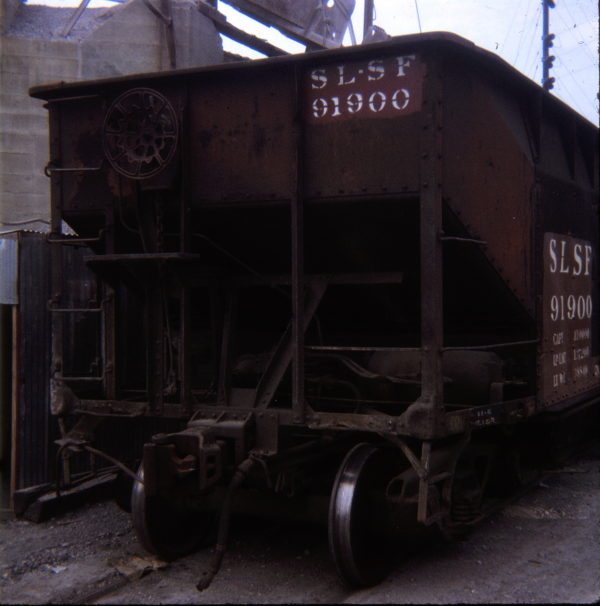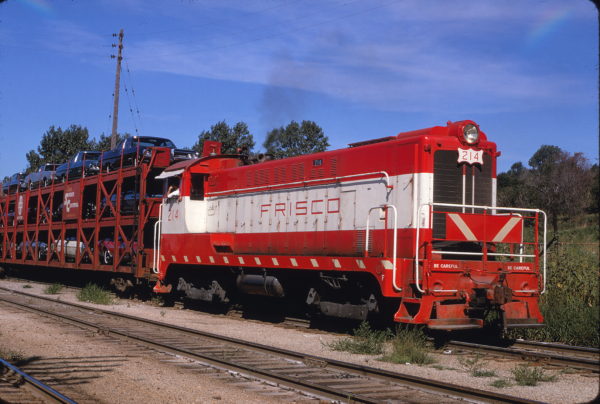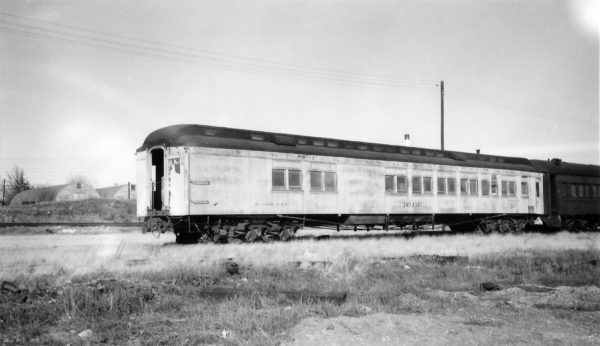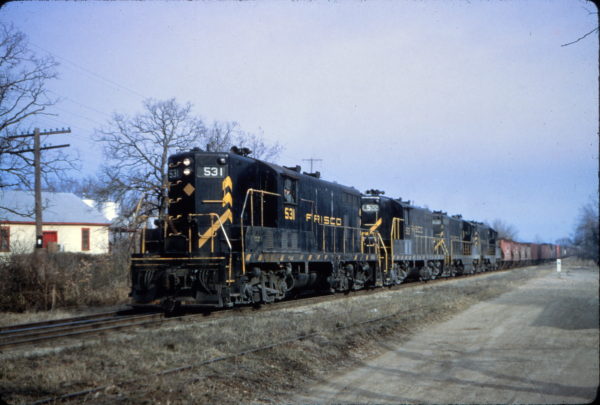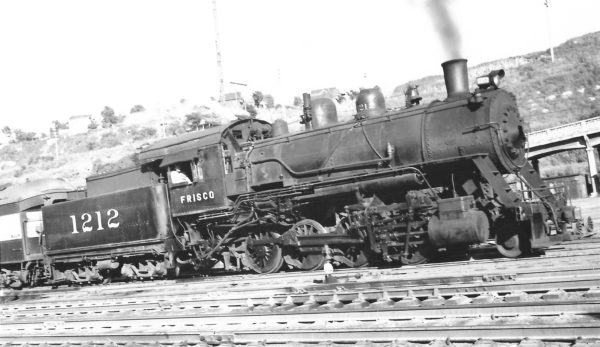Monthly Archives: May 2018
U30B 835
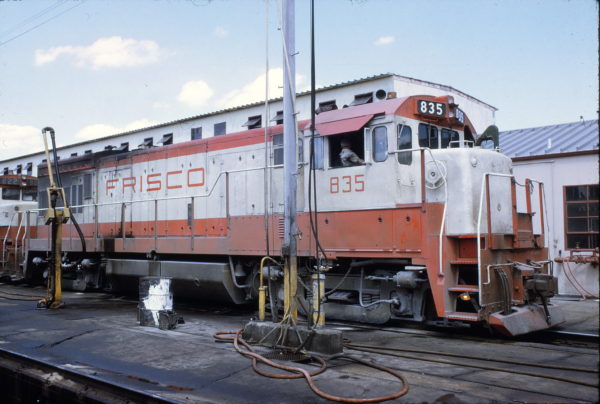
U30B 835 at Tennessee Yard (date unknown).
Location is Memphis, Tennessee.
The locomotives are at the Mechanical Department’s service tracks area at Tennessee Yard. Coupled to U30B 835 is U25B 822. The locomotives are on the south end of service track 1. While here they can receive diesel fuel, lubricants, water, crew supplies, side inspections and underbody inspection from the pit below and between the rails. At the north end of this and adjoining tracks are sand towers to resupply the sand boxes on either end to the locomotives.
The single track diesel shop is visible in the background above the locomotives. Over the cab is the southwest corner of the shop. Visible to the right of the subject locomotive’s nose is a single story extension to the shop. Behind the shop extension is the locomotive track door on the south end of the shop. In the foreground note the below ground pipe tunnel with metal tread plate covers.
The lighting and locomotive weathering in this view highlight interesting locomotive details. These include the grab irons on the cab front wall and below the number board eyebrow, the windshield wipers (the center two have a connecting rod) and engineer’s wind deflector with lower rear view mirror. Further back is a vertical Automatic Car Identification (ACI) placard and oil stains on the hood top, engine compartment doors, walkway and down the side sill.
Under the side sill are the speed recorder cable, brake wheel chain pipe guide, bell above the forward main air reservoir and ribbed air filter behind the diesel fuel tank. Just aft of the fuel tank fill pipe (note the side sill notch) is the emergency fuel cutoff button. The fuel tank has two fuel level gauges, round near the front and vertical near the center by the fuel fill. Near the rear step is locomotive ownership trust plate.
View is looking northwest.
Special thanks to Mark Davidson
NW2 254 and SW7 304
E8A 2012 (Flying Ebony)
Hopper 91900
VO-1000 214
Wooden Work Coach 105436
Caboose 1164
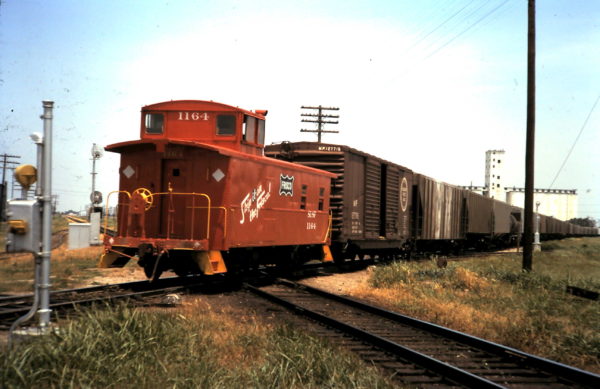
Caboose 1164 Enid, Oklahoma (date unknown).
Location is Enid, Oklahoma.
Train is just crossing the railroad crossing at grade, with automatic interlocking, with the C.R.I.P. (Chicago, Rock Island & Pacific) at mile post 585.0. It is eastbound on the Beaumont Subdivision. Interesting to note the Frisco’s Perry Subdivision used the Beaumont Sub between Steen and Enid (1.8 miles). This train left Enid to the west at mile post 585.7 (Perry Subdivision mile 544.9). The photographer is southwest of the diamond.
In the distance just to the left of the caboose is the southbound interlocking signal for the Rock Island. Note the round targets have been trimmed on the main track side due to close clearance. Further to the left, this is created by the close proximity of the connecting track on the northwest quadrant of the diamond crossing. This track provided access between the Rock and Frisco. It also provided access to the south end of the Pillsbury Mill and Elevator complex. Pillsbury is just out of view beyond the left edge of the photo.
Just below the third freight car from the caboose is the connecting track to the Santa Fe’s 10th Street Yard. Just to the right of the right hand telegraph pole is the westward interlocking signal protecting the Santa Fe’s access to the Frisco’s main and the crossing diamond. Santa Fe used trackage rights over the Frisco to cross the Rock Island at this point.
Also on the right above the train is the Southwest Terminal Elevator. Over the years this elevator has also been operated by and known as the Salina Terminal Elevator Company, Feuquay and Archer Daniels Midland (1970s). It is located at 1700 North 10th Street, Enid, OK. The elevator has a capacity of 1,125,000 bushels. It was built in 1926 and 1927. The elevator’s dimensions are 394’ long by 65’ wide. The silos stand 100’ tall, the horizontal conveyor gallery tops out at 112’, with the work or head house standing 192’ tall.
View is looking north northeast.
Special thanks to Mark Davidson.
